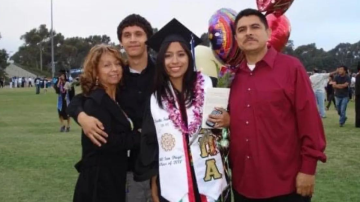Being a First Gen Latina in College Was Isolating But It Made Me Stronger
“Tu madre está mal y es tu culpa"

Photo courtesy of Dr. Lisette Sanchez
Dr. Lisette Sanchez is a bilingual licensed psychologist and founder of Calathea Wellness, a virtual practice providing individual therapy in California. She has a passion for working with BIPOC folxs and first-generation professionals.
These are the words that echoed in my mind after receiving a call from my grandmother a few months into my college journey — your mother’s not doing well and it is your fault. My grandmother was referring to my decision to move away for college and the nervios that it was causing my mother. I was the first in my family to finish high school and go to college. As difficult as the transition was for me, it was also challenging for my family.
I grew up in the San Fernando Valley in North Hollywood, CA. I am the eldest daughter of hard working-class immigrants from Mexico and El Salvador. My family supported my decision to go to college, in fact they highly valued education and would constantly tell me to echale ganas and keep up with my school work. However, my parents had an expectation on how this dream would be realized. They envisioned that I would attend a local college and live at home until I married so they figured at least until I was 25. They did not expect that I would choose to move away to college and live in dorms.
Being the first to go to college came with many struggles. First there was the process of applying and completing all of the supporting documents. I had a teacher who helped me through this process, Mr. Fitz. He assigned our personal statements and would sit with us as we submitted our applications. Many first-gens have to navigate this process on their own and it is a very confusing and stressful process. It can also be expensive. My high school provided me with six fee waivers and that is how I approached choosing where to apply.
I chose UC San Diego, a strategic choice for me. It was only two hours away from my parents and about an hour from my family across the border in Tecate, México. I hoped it would help my parents feel more comfortable knowing that I had family nearby.
Once I started college, there was so much pressure. I was managing the guilt I felt about moving away and the impact it had on my family. I also experienced an internal pressure to “pave the way” for my younger brother and cousins. I did not want my younger family members to experience the same resistance that I was subjected to. Furthermore, there was also stress about finances. I took on work-study jobs and participated in research studies to help my family financially. Looking back, I recognize that I took on pressure that was not mine to bear.
It was not my responsibility to pave the way for younger generations or to manage my parents’ emotions around my decision. I was paving the way for myself and my big dreams. I was navigating my own emotional distress during the transition. That was already enough.
My grades suffered because of the stress that I experienced. I frequently felt lost, overwhelmed and anxious. I experienced self-doubt and often felt out of place. I didn’t know it then but I later learned that I was experiencing the impostor phenomenon aka impostor syndrome. My GPA dropped a full letter grade during my first term in college. I felt defeated and demoralized. I also felt homesick at times and I was afraid to admit it. However, I was also very determined and I was lucky enough to have a strong community of support within my dorm mates. In fact, one of my dorm mates, Maria, introduced me to the TRIO Student Support Services Program. This program helped me with my adjustment to college. They provided tutoring and mentorship services. They also helped me learn more about the importance of prioritizing my personal needs.
Even though I was learning that taking care of my mental health was important, it took me time before I sought out professional support. I went to see an on-campus therapist during my second year, but I felt invalidated by them. They were white and so I did not feel that they understood the challenges associated with being a first-gen, eldest daughter of Latinx immigrants. I also did not feel that they made an effort to understand my experience and I didn’t feel seen. I felt intimidated and did not feel comfortable voicing my feelings. This therapist further represented the challenges I experienced instead of being a safe space for me to receive support.
Honestly, it took me time before I went to see another therapist after that. Instead, I learned to lean into people and spaces in which I felt safe. It was mainly other first-gen Latinx students since we had a shared experience so it helped me feel less isolated. I learned that having a strong community helped with reducing my stress. That community is what helped me finish college and continue to pursue my graduate degrees.
The first-gen experience is often filled with many unknowns and obstacles to overcome.The ones I shared are just a snippet of the many challenges first-gens may experience during their college experience. Overcoming these obstacles requires an individual to be proactive, resourceful, resilient, and adaptive. These are just a few of the strengths associated with being first-gen. These are the assets that helped me survive and thrive within my first-gen experience.
My first-gen identity and experience strongly informs my current work as a licensed Psychologist, coach, and speaker. In fact, I specialize in working with BIPOC and First-Gen Professionals. It is also why I am so passionate about destigmatizing mental health and empowering my fellow first-gen community.
Sí se puede!

















